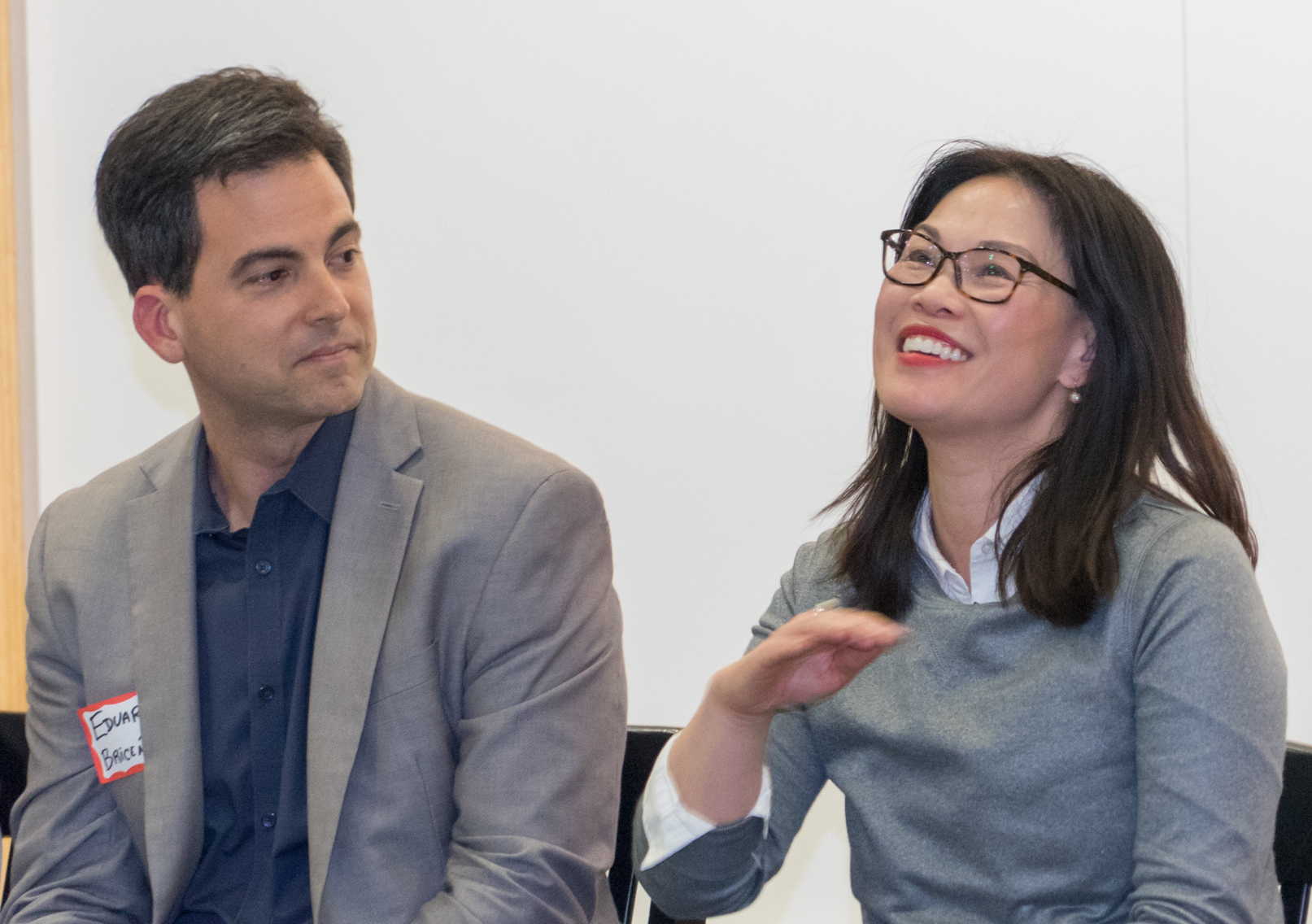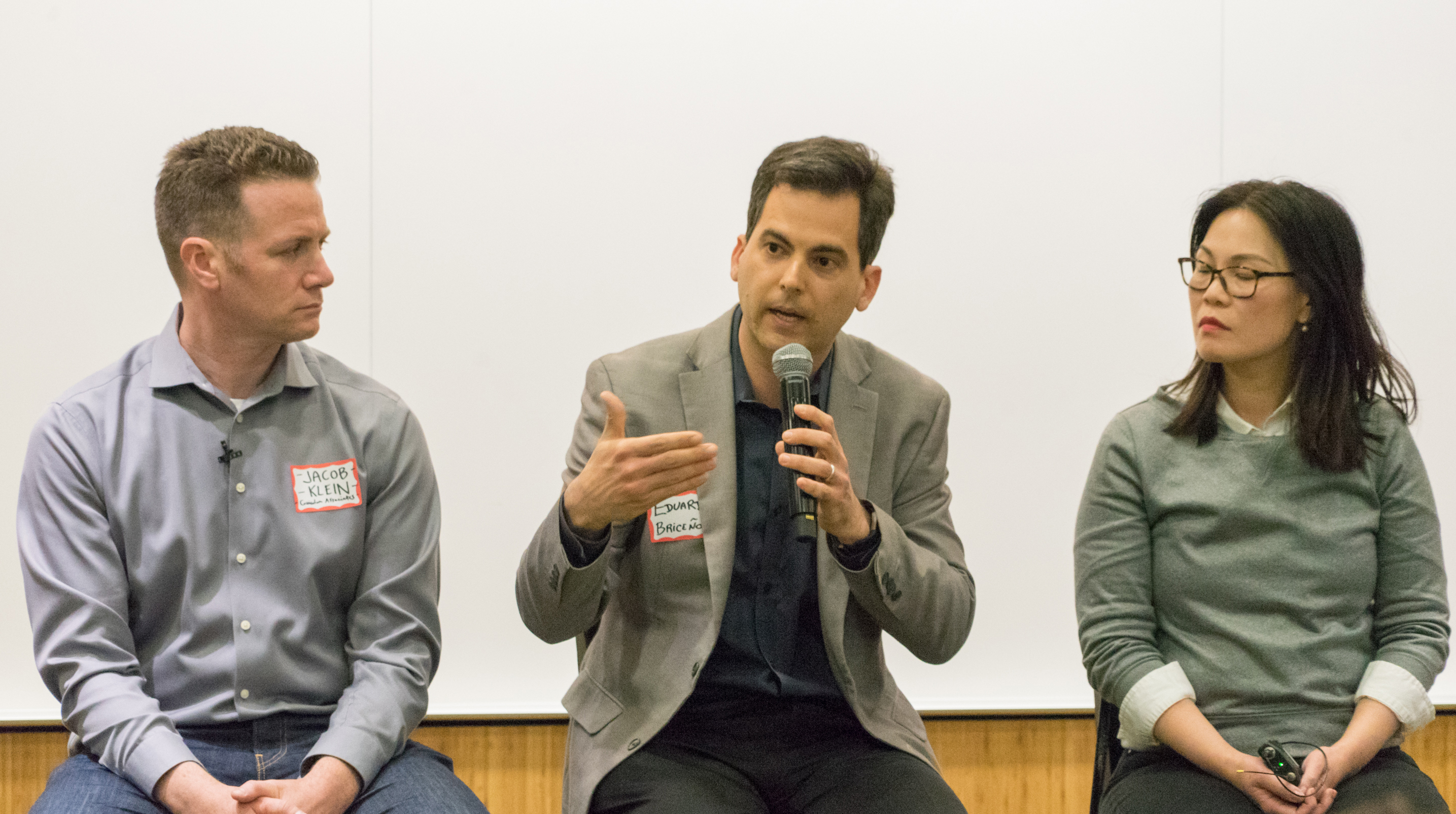Five GSE alumni who've launched education-related companies share their tales of the ups and downs of founding
Like most entrepreneurs, Glenn Singleton started his company to fill an unmet need. Unlike many, he launched his venture while still in school.
“I knew as a grad student that what I wanted to contribute to the world did not exist already,” said Singleton, MA ’93, whose firm, Courageous Conversation, offers workshops and training against systemic racism to media, law enforcement and corporate clients.
“And I was struggling with how I was going to do my best work and stay within the rules of institutions of education.”
Singleton and four other founders who are Graduate School of Education alumni returned to the GSE on April 25 to share their stories with the GSE community in an EdEntrepreneurs panel sponsored by EdCareers, the career-services and professional-development wing of the GSE.
The panelists – Singleton; Danielle Harlan, MA ’09, PhD ’11, whose Center for Advancing Leadership and Human Potential develops leaders through workshops, webinars and coaching; Jacob Klein, MA ’10; Eduardo Briceño, MA/MBA ’07; Tina Lee, MA ’10; and moderator Nereyda Salinas, ’96, founder and director of EdCareers – are accomplished but not that unusual by GSE standards. Fully 31 percent of GSE graduates have founded at least one organization, according to EdCareers alumni statistics.

“That’s not just 31 percent since mobile app development became a thing,” said GSE Dean Daniel Schwartz, who welcomed the crowd. “That statistic – that 31 percent – has been nearly constant over the past 50 years.” It’s also remarkably consistent across gender and socioeconomic origin.
Panelists gave advice that was practical and often very personal, from surviving the start-up phase to dealing with fear and setbacks.
“For me, tutoring was crucial,” said Jacob Klein, whose company Motion Math, founded with LDT classmate Gabriel Adauto, MA ’10, was recently acquired by Curriculum Associates. “It’s a high hourly rate, not many hours a week. It gave me a set number of hours a week for pitching. Meanwhile, 3 p.m. to 8 p.m. was earn-some-money time.”
Eduardo Briceño, on the other hand, came to Stanford as a former venture capitalist disillusioned with that life.
“I wanted to spend life here on Earth in a way that would impact other people,” he said. “At Stanford, I was introduced to Carol Dweck. She’d written a book on growth mindset and she wanted to create an organization around it.”
The firm they founded, Mindset Works, leverages Dweck’s research through programs for teachers and students. “We change schools to become places to ignite learning rather than kill it,” Briceño said.
Tina Lee’s nonprofit, MotherCoders, helps widen the tech talent pool by staging coding bootcamps with childcare and other mom-friendly amenities. It stemmed from an “epiphany” she said she had while struggling to relearn tech skills after the birth of her second daughter.
“I threw out a Google poll. Within a few days I had 100 responses. I knew there was something there,” Lee said.
Yet Lee, a first-generation college graduate, was candid about the stress of entrepreneurship on families and emotions.
My grandparents sacrificed so much for me to be here,” she said. “Am I honoring their legacy? … I have gone further than anyone else in my family. I’m doing things that they couldn’t do. And that is honoring their legacy.”

Panelists cautioned would-be founders that the worlds of start-ups and education can mesh poorly on factors like organization and purchasing.
“I learned that the ed space is sometimes discordant with the way business works,” Singleton said. “Educators are called to do business things like running schools, but unlike businesspeople they don’t get to do a lot of hanging around with others who do that.”
Said Klein: “There are so many levels between the [ed-tech] user and the person who makes the buying decisions that it can be frustrating.
“Build relationships with educators who will allow you into their classrooms to verify your ideas,” he advised. “That’s essential for testing, and it sustains me spiritually in the work.”
All panelists said that founding requires passion, but with hard work can bring contentment.
“There are just a few things that offer liberation,” Singleton said. “One is to have community that you depend on. Another is quite capitalistic -- to not have a landlord.
“The third is to have freedom in your profession. I do get to choose my clients. If it’s not working, I walk away.
“The longer you stay in this, the more you can have that feeling.”
Schwartz said the GSE is finding new ways to build its students’ and alums’ capacity as makers and founders.
In January 2018, it began hosting a GSE Entrepreneur in Residence, inaugurally Sergio Monsalve, to mentor and guide the GSE community on social impact, strategy and design.
The Dean’s Collaborative Learning Fund supports student-led initiatives that promote scholarly camaraderie and exchange at the GSE.
Finally, EdCareers continues to nurture sustainable career development opportunities for GSE students and alumni and in the wider education community. To that end, Salinas said EdCareers plans to capture that GSE entrepreneurial knowledge base and share it with other aspiring GSE entrepreneurs.
-- Barbara Wilcox

Marc Franklin
Top photo: Klein, Briceño and Lee field audience questions at the April 2018 EdEntrepreneurs panel sponsored by GSE's EdCareers. All photos by Marc Franklin.
